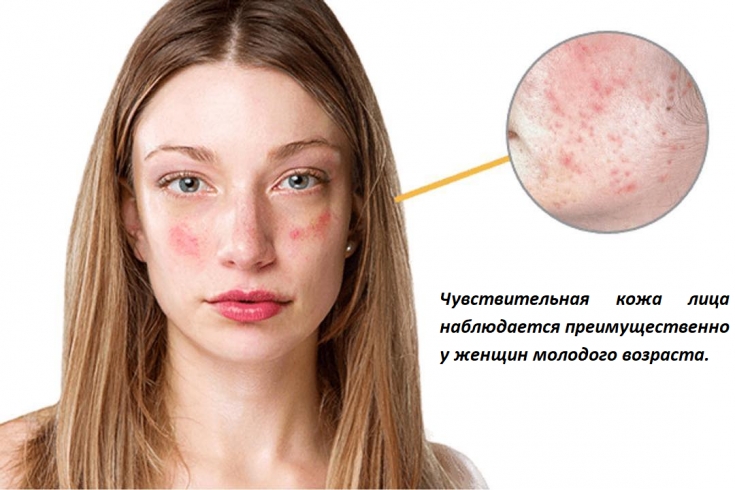According to modern concepts, sensitive skin syndrome refers to her tendency to develop hyperergic reactions in response to common external or internal stimuli.
According to statistics, every third patient has sensitive skin: the prevalence of the syndrome in the United States is 44.6%, in Europe – 38.4%.
Care for sensitive skin of the face has some features that must be taken into account by a doctor recommending certain cosmetic products to a patient.
For more information on what are the causes of the development of sensitive facial skin syndrome, as well as about features of cosmetic care, read on estet-portal.com in this article.
Sensitive facial skin: what factors provoke hypersensitivity
For the first time, the concept of "sensitive skin" described in the 60s of the last century by H.Thiers, who defined this condition as a clinical syndrome.
Follow us on Instagram!
After 10 years, a protocol was developed to use a lactic acid test to confirm that patients had skin prone to developing hyperergic reactions. This method of research in our time has great diagnostic value.
Sensitive skin is characterized by a polymorphism of clinical manifestations: subjective sensations of itching, burning, tightening of the skin may be accompanied by objective signs of its inflammation.
Exacerbation of symptoms of sensitive skin can be provoked by such factors:
1. Psycho-emotional stress – helps to reduce the threshold of sensitivity to substance P;
2. Nutritional agents (alcohol, caffeine, spices) – contribute to the occurrence of vasodilation, thereby potentiating skin hyperreactivity;
3. Changes in environmental conditions: cold or dry air, sudden temperature changes, ultraviolet radiation increase the level of pro-inflammatory cytokines.
It is known that there is a hereditary predisposition to the development of sensitive skin syndrome.
Sensitive skin of the face is characterized by a tendency of vessels to vagotonia, a reduced content of sphingolipids, and the presence of a thinned stratum corneum of the epidermis.

The skin of the face is most prone to the development of hyperergic reactions. This is due to some of its anatomical features (a large number of receptors and nerve fibers, a relatively thin stratum corneum), as well as the fact that facial skin is most often exposed to chemical irritants (decorative cosmetics, make-up removers).
Why skin barrier regeneration is important
Sensitive facial skin: the role of biologically active substances
In the development of clinical signs of sensitive facial skin, the main role belongs to the peculiarities of its response to biologically active substances.
According to the latest scientific data, the stratum corneum of sensitive skin contains an increased level of NGF (nerve growth factor – nerve growth factor).
The NGF factor sensitizes the skin receptors to the action of even ordinary stimuli, thereby contributing to the development of subjective and objective signs of its hyperreactivity.
As mentioned above, patients with sensitive skin have a thinner stratum corneum of the epidermis, which has a genetically determined etiology. In addition, it has an increased permeability to alcohols, ethers, glucose, which must be taken into account when choosing care products.
Follow us on Telegram!
Care for sensitive skin of the face: a choice of cosmetics
Care for sensitive skin has a number of features. First of all, it must be taken into account that products for the care of sensitive skin should not contain agents that promote the development of sensitization. But at the same time they must "complete" those skin protection factors that it is genetically deprived of (a full-fledged stratum corneum of the epidermis).
The choice of daily care products for sensitive facial skin is of particular concern.
Correctly selected cosmetics helps restore the barrier functions of sensitive facial skin, in particular the lipids of the stratum corneum, as well as reduce its hyperreactivity.
Corneotherapy – restoration of the protective properties of the stratum corneum of the epidermis with the help of cosmetics.
Taking into account the need to create cosmetics for the care of sensitive facial skin, aimed at restoring the stratum corneum of the epidermis, KOKO GmbH & Co KG (Germany) has developed a special line of cosmetics.
According to estet-portal.com, cosmetic products for sensitive skin care of the Dermaviduals line are among the best products on the market of the beauty industry.
Functions and structure of the skin. Skin lipid barrier composition
Proper daily care for sensitive skin

As mentioned above, for patients with sensitive facial skin, proper daily care is of particular importance.
For sensitive skin, KOKO GmbH & Co KG has specially developed DMS–Basiscreme High Classic.
It is ideal for daily facial skin care, softens and moisturizes it, and also helps to even out tone.
The main advantage of Basiscreme High Classic cream, which qualitatively distinguishes it from other sensitive skin care products, is the presence of DMS (Derma Membrane Structures).
DMS – these are special lipid complexes similar to those present in the stratum corneum of the epidermis.
Topical application of DMS–Basiscreme High Classic cream from Dermaviduals to sensitive skin promotes not only its hydration, but also the restoration of the barrier functions of the epidermis.

Thus, DMS –Basiscreme High Classic cream affects hypersensitive skin "from the inside", thereby effectively preventing the development of itching, dryness and redness.
To care for very sensitive skin, it is necessary to use products that are thoroughly cleansed of all possible chemical irritants (emulsifiers, silicones, amines, preservatives).
Novriten cream with DMS meets these characteristics. In addition to DMS, it also contains evening primrose oil, a source of vitamin E and polyunsaturated fatty acids.
The cream has a light texture, easy to apply and absorb. Ideal for daily care of hypersensitive facial skin.
Thank you for staying with estet-portal.com. Read other interesting articles in the section "Cosmetology. You may also be interested in: Corneotherapy products help restore the skin's protective barrier







Add a comment